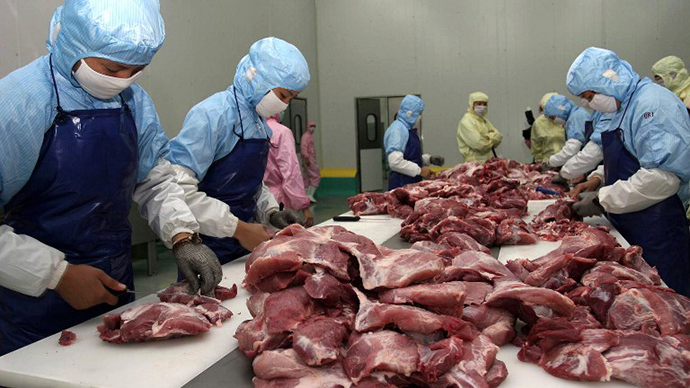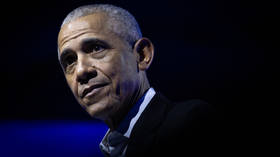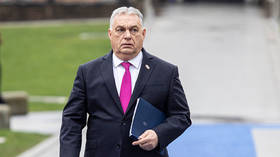Year of the… pig? US and Chinese presidents' summit, with meat at the top of the agenda
China may be on the verge to clinching a takeover of US pork producer, which, if the deal goes through, will be the biggest Chinese takeover of an American company.
Chinese President Xi Jinping and US President Barack Obama meet
for their first summit in California on Friday. The business
world is looking for any signs of greater cooperation on trade
and investment, especially the meat trade issue.
At the summit, the Chinese are eager to invest in the US, while
the world’s largest economy needs those investments to boost the
economic recovery.
With demand growing China's biggest meat company Shaunghui
International is looking to purchase top US pork producer
Smithfield Foods for a reported $4.7 billion.
The deal still requires approval from the US Committee on Foreign
Investment. Smithfield shareholders will receive $34 per share.
"Together, we will be able to meet the growing demand in China
for pork by importing high-quality meat products from the US,"
Shuanghui said in a statement.
As the world’s most populous nation is getting richer, the
Chinese demand for meat is also increasing, which has driven
imports sky high. Local meat firms are now switching their eyes
abroad for partnership and acquisitions of foreign meat farms.
China bought in 25,640 tonnes of US pork in April, compared with
nearly 32,000 tonnes a year before, according to the US Meat
Export Federation.
Shuangui already controls China’s top pork producer and believes
the takeover will give the US company "the opportunity to
expand its offering of products to China.”

China has also been showing more interest in beef. Importing beef
is much cheaper for the Chinese than breeding cattle, Reuters
reports. Beef imports jumped in January-April to more than 75,000
tonnes, over 10 times more than during the same period last year.
"Farmers aren't breeding any more. It gives poor returns and they
prefer to move to cities to work where they can earn 100 yuan
($16.30) a day, while a cow only earns them 3,000 yuan a
year," Liu Chunsheng, sales manager at one of China's
earliest beef processors Fuhua told Reuters. "The beef market
is very scattered. There's not a single big company," Liu added.
"It's to do with capital. This year everyone's losing money. Live
cattle are expensive and imports are cheap. It's quite
simple."
As China’s demand for beef is growing fast, the US still hopes to
set foot on the Chinese market. China currently allows beef
imports from Australia, New Zealand, Argentina, Uruguay and Costa
Rica. Four Canadian firms have been added to the list of
authorized exporters. A deal has also been signed with India to
import buffalo meat.
"If China opens its market to US and Indian beef, the growth rate
(in imports) will exceed double-digits," Reuters quotes
Rabobank analyst Pan Chenjun as saying.
Zhigang Tao, from Hong Kong University's School of Economics and
Finance, spoke with RT about the relations between the US and
China. He believes that the Americans can never get enough.
"I think the meeting is extremely crucial in building up trust
between the two countries. To the Chinese people, they get the
feeling it’s always the Americans who are asking for more and
more on the economic front. So, they are asking China to open up
the market," he explains. "Once you open up the market
they ask you to buy more US treasury bonds. With Americans
constantly asking for more, you feel like an athlete – the better
you perform, the more you have to deliver in the future. This is
the feeling for the Chinese people. To me, China and the US,
these two countries are like a couple. You don’t really argue in
front of many people, you should really argue in your own home.
So, this meeting is really crucial for these two countries’
leaders’ building personal trust.”
Another field of major Chinese interest in the US is commercial
real estate. Just a few days after the Shuanghui International
announced it would buy US pork producer Smithfield Foods came in
the news of the reported $1.4 billion sale of the 50 storey
General Motors tower in mid-town Manhattan. A group led by
real-estate tycoon Zhang Xin acquired a 40 percent stake in the
most expensive building in the United States, China Daily USA
reports. The deal was closed on June 2.
Also behind the diplomacy, there's a range of prickly subjects
between the two countries, with Washington accusing Beijing of
launching a cyberwar. The accusations of cyber warfare have been
mutual, and the US has openly accused the Chinese of cyber
snooping on government entities as well as media outlets.
Many American media outlets -The New York Times, The Washington Post, and Bloomberg News- reported hacking on sensitive data in early February,
The cyber espionage has also spilled over to US military and defense data. The US Defense Science Board publish a report saying that nearly 40 Pentagon weapons programs and almost 30 other defense technologies were compromised by Chinese hackers, some allegedly tied to the military or government.
In February US data company Mandiant reported it tracked
141cyber-attacks
conducted by a single Chinese hacker group since 2006, 115 of
which targeted US corporations.














